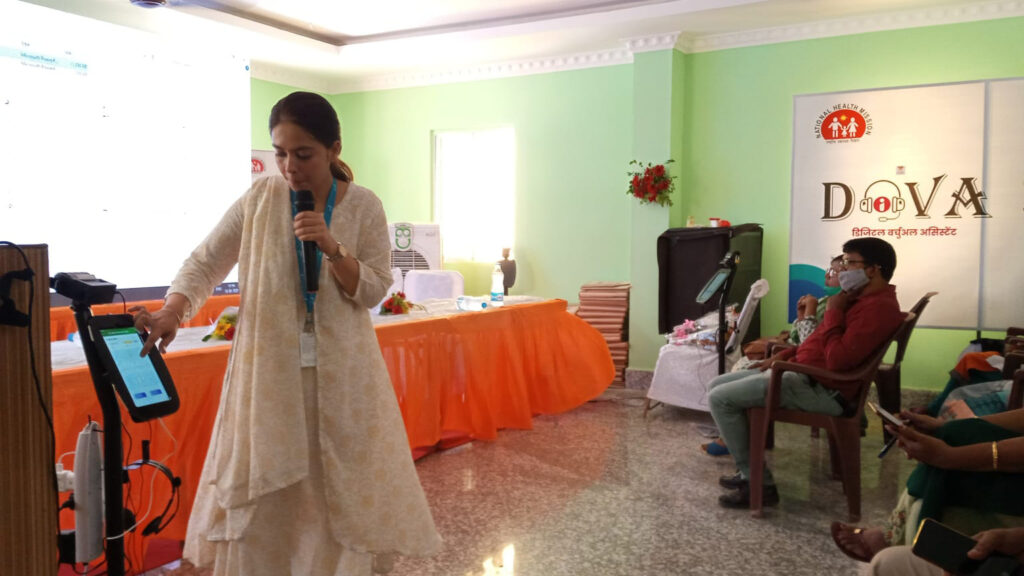
New Delhi, India (July 28, 2022)
- Problem: A gap in the ability of clients to make informed decisions on family planning choices
Public health facilities in India are often overloaded with emergency and high priority cases, making family planning and reproductive health—for youth, women and couples—a secondary concern for health care providers. And while ASHAs, accredited social health activists, provide information on family planning methods, the broad basket of choices often leaves clients wanting more information. These issues create gaps in clients’ abilities to make informed decisions on family planning choices.
- Solution: DiVA—an artificial intelligence-based application
Through a successful proposal to the 2021 Catalyst Fund, Jhpiego’s inhouse competition for funding to rapidly test innovative ideas to address tough priority challenges, Jhpiego India used an artificial intelligence-based application—DiVA—to close the gap in clients’ ability to make informed family planning choices.
Using Catalyst Funds, Jhpiego India, in close collaboration with the Government of Jharkhand and the National Health Mission, introduced DiVA (Digital Virtual Assistant) on a pilot basis in five facilities in Jharkhand—in two rural facilities in Bokaro district and three in Ranchi. This digital intervention provides family planning information to clients at the point of care in public health facilities.
DiVA makes use of the waiting period between registration and consultation. In 10–15 minutes, the application can provide users with relevant information on their family planning needs. DiVA uses a digital touchscreen kiosk to ask users a series of questions to determine their reason for the visit and interest in family planning and collect clients’ health history. It then provides a list of family planning methods the client is eligible for and information about each method, including an image of the method, advantages and disadvantages and dos and don’ts. DiVA then prints out a record of the client’s responses to the questions, eligible family planning methods and client’s preferences.

The artificial intelligence-based application is designed to adapt to a user’s level of literacy—icons accompany each question and a voice-over is available for low-literacy users. To make users feel comfortable, secure and private, the kiosk’s digital tablet is supported with a headphone.
Data show that the pilot has been a success. In June 2022, only 6% of the clients at the participating health facilities said they were there for family planning, but 74% reported on DiVA that they were interested in family planning.
DiVA can transform the relationship between a client and a health care provider. DiVA empowers clients by providing them with information so that, by the time a client sees the health care provider, they have the family planning/reproductive health information they need, and providers can focus on the client’s questions. This enables clients to make more informed decisions and improves their satisfaction and interaction with providers. Information, coupled with better understanding of providers’ instructions, can lead to improved adherence to medications and reduced health complications. DiVA also reduces the load on service providers and saves them time.
“Jhpiego, having worked in the country for over 10 years now, has always aimed to help communities adopt family planning methods with informed choice and empowered decision-making,” says Dr. Kamlesh Lalchandani, Director, Programs and Program Operations at Jhpiego India. “We have always looked for innovation as a means to solve problems to address family planning needs.”
On June 18, 2022, Jhpiego India announced the installation of DiVA at the community health center in Angara in Ranchi, Jharkhand, in the presence of the National Health Mission State Nodal Officer, Family Planning Cell State Coordinator, and community health center officials. Dr. Anil Kumar, Jharkhand National Health Mission State Nodal Officer, and Gunjan Khalkho, State Coordinator, Family Planning, expressed their interest in expanding the use of this technology, taking it closer to the community.
In the near future, Jhpiego India expects that DiVA will be able to provide a safe environment for clients to secure counselling for mental health, reproductive and sexual health and management of lifestyle diseases.
“We believe that enabling the ‘demand’ drivers in the health care ecosystem is an absolutely essential part of achieving our dream towards value-based care delivery. Interventions like DiVA and its adaptation to areas such as family planning, maternal health, noncommunicable disease management, etc., are stepping stones in this direction,” says Dr. Anunaya Jain, India Digital Health Lead.
Many of our underlying public health care concerns can be addressed via digital innovations. We, in the public health care sector, just need to be more creative and collaborative with the government to fill gaps in the health care system.”
Dr. Anusha Sharma, Program Officer at Jhpiego India.
At Jhpiego’s first annual Sparkfest on July 18, 2022, Dr. Sharma presented the DiVA innovation to the global Jhpiego audience. The simplified problem statement and the gap in the health care system became visually evident to all.
Jhpiego’s DiVA mobile application can be downloaded from the Google Play Store.
Jincy Chacko is a communications officer in Jhpiego’s office in New Delhi, India.



